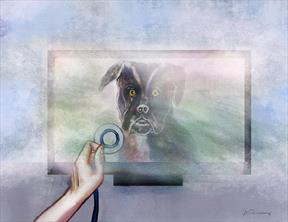 Listen to this story.
Listen to this story.
telemedicine art

Illustration by Jon Williams
Fresh off seven months of relief work and reentering the job market last summer, Dr. Amy Reed came upon an enticing job listing. "Remote and flexible telemedicine job opportunity for veterinarian," the online advertisement beckoned.
Weary of routine clinical practice, Reed, age 63 and living on Long Island, envisioned working another 10 to 12 years if she could find a less demanding veterinary job, possibly something online. So she answered the ad from Dutch Pet, a company founded by the same individual who started the direct-to-consumer human health care company called Hims and Hers. She also reached out to FirstVet, a provider based in Europe.
After talking with both last fall, she determined that neither company was the right fit, Reed told the VIN News Service. Worried that publicizing her experience might damage her job prospects, the veterinarian asked to use a pseudonym for this article.
Still hopeful that some form of telemedicine was the right direction for her, Reed set out to decipher the nuances of New York's regulations governing online-only veterinary care. A key question loomed: Could she establish a veterinary-client-patient relationship (VCPR), the foundation for all care, remotely instead of in person?
Her quest for clarity led her into a regulatory labyrinth. Most states require a hands-on physical examination to initiate a VCPR because animals cannot use human language to tell doctors how they feel. New York's existing statute, predating the era of care by video, does not address veterinary telemedicine or specify that a VCPR be established in person. The state Department of Education, which oversees the Office of the Professions, has supplemental guidance on the VCPR that calls for the "timely examination" of the patient. However, the guidance does not specify that the examination be done face-to-face. A disclaimer on the department's website states that noncompliance may be interpreted as "professional misconduct only if the conduct violates pertinent law, rules and regulations."
Confused, Reed called the veterinary board office. She later recounted the bewildering conversation on a message board of Veterinary Information Network, an online community for the profession and parent of VIN News: "I was told that the New York practice act does not allow a VCPR to be totally virtual and so, would not allow diagnosing and prescribing. When I pressed further with questions about whether it was legal and how these companies could be saying it was fine, the employee (who was very knowledgeable and helpful) told me that it was not a law but rather only a guideline."
However, Reed continued, the board representative suggested that the "guideline" had teeth: "She explained that if I misdiagnosed a patient and caused harm or the animal died, that it could be construed as professional misconduct."
In the absence of clear direction from guidelines and statutes, VIN attorney Raphael Moore advised a conservative approach. "Ultimately, if/when a case goes bad, the question will be whether or not you were negligent. That will turn to standard of care, and whether it was breached," he told Reed in the VIN discussion. "VCPR issues aside, I would suggest that Dx or Rx [diagnosing or prescribing] using telemedicine only, except in the most absolute rudimentary of situations (if those really exist) will be a breach of standards."
In an interview with VIN News, Moore continued: "Folks should remember that at the end of the day, regardless of whether telemedicine is permitted and the extent to which it is regulated, it is a tool that hasn't been vetted well in courts or among veterinary medical boards. If a client sues because of injury to their pet, or a veterinary medical board considers disciplinary action, the veterinarian will be in somewhat uncharted territory."
The New York State Veterinary Medical Society, a professional organization, is unequivocal. In an email, Tim Atkinson, executive director, said that in his discussions with the Department of Education, "they have always been clear that under current guidelines, an in-person examination is required to establish a VCPR."
Dr. Doug Aspros, chair of the veterinary regulatory board, an agency under the Department of Education, sees it differently. "Right now, [New York state] has no legal requirement for a VCPR — the guidelines represent what we think is the standard of care, but it carries no force of law," he said.
To address this, the board will meet on April 12 to explore redefining the VCPR, potentially allowing remote care with prescribing limitations or other "guardrails," according to Aspros.
"We would like to be more explicit," he said, "but we are not yet sure what is the best path forward."
Atkinson said the NYSVMS prefers the board to clarify guidelines to require the in-person establishment of a VCPR. In a letter dated Dec. 4, then-president Dr. Paul Amerling expressed the association's "deep misgivings" about allowing a virtual VCPR.
"If you do take this step, we urge the board to consider that the safest way to mitigate the risk of a new medical technology would be with the most stringent set of guardrails and protection in place," Amerling wrote.
Officials from Dutch Pet and FirstVet did not respond to calls from VIN News seeking their views. Both companies aim to expand their footprint in a market valued at $530 million and projected to grow to $1.2 billion by 2028.
Telemedicine regulation dilemma
Reed's experience exemplifies the fog at the crossroads of veterinary medicine and telemedicine — uncertainties that arose as regulations governing remote care were temporarily relaxed during the Covid-19 pandemic and subsequently reinstated.
A central issue is whether to remove restrictions that require practitioners to first examine patients in person, thereby granting telemedicine providers who have no physical clinic unfettered access to patients.
The American Veterinary Medical Association and related organizations underscore the importance of an initial face-to-face exam, emphasizing that animals cannot speak in human language.
However, the obligation for an in-person exam to establish a VCPR poses a dilemma for the American Society for the Prevention of Cruelty to Animals and other shelter groups that advocate expanding access to care. Their concern is that securing face-to-face appointments is challenging due to practitioner shortages, especially in areas of the country with few or no veterinarians.
The access-to-care argument is making an impact. Last year, Arizona and California joined a handful of other states by enacting legislation to allow a VCPR to be established remotely.
Florida's stance is ambiguous, too
Similar to New York, Florida law is silent on veterinary telemedicine. Its statute governing veterinary practice says a VCPR is established if a veterinarian "has assumed responsibility for making medical judgments about the health of an animal and its need for medical treatment." It also says veterinarians can prescribe drugs provided they have "sufficient knowledge of the animal to initiate at least a general or preliminary diagnosis," which implies the veterinarian is "personally acquainted" with the animal and has recently observed it or the premises where it's kept.
The corresponding regulation in the Florida Administrative Code bars veterinarians from prescribing unless they have "recent contact" with the animal — language that is not reflected in the state's VCPR definition or prescribing statute.
Advocates for and against requiring an in-person exam have battled for years in Florida, with neither side prevailing. Last year, for example, two bills governing the practice of veterinary telemedicine were introduced, one affirming that a VCPR must be founded during an in-person exam, the other authorizing remote establishment. Both bills stalled.
The battle continues. On Feb. 1, the Florida House of Representatives unanimously passed the Providing Equity in Telemedicine Services Act (HB 849), which would allow a veterinarian to establish a VCPR remotely. A companion measure recently passed the Senate Committee on Regulated Industries.
The Florida Veterinary Medical Association opposes HB 849. "We will continue to defend the interests of veterinarians and animals by ensuring Florida adheres to the federal definition of VCPR, which protects animals from the chance of misdiagnosis and delayed care," the association wrote in a legislative recap.
Taking the issue to the ballot
In a number of states, authorities are standing firm on the need for a veterinarian to do a hands-on exam before providing care remotely. Last year, officials in Kentucky, Delaware, Michigan and Illinois affirmed or reiterated the necessity of an in-person VCPR requirement. West Virginia, Hawaii and Nevada enacted laws stating the same in 2022.
Advocates for unbridled telemedicine are trying to find workarounds. Colorado is a case in point.
The ASPCA and nonprofit animal welfare group Dumb Friends League are collecting signatures in an attempt to put what's called the Colorado Veterinary Telehealth Initiative on the ballot in November. The measure would allow a VCPR to be established "through audio-visual communication."
Legislation in New York
Back in New York, lawmakers are considering A6745, introduced in January. If enacted, the legislation will clarify that having "sufficient knowledge" of a telemedicine patient means satisfying at least one of the following: a recent examination of the animal in person; current knowledge of the animal through diagnostic equipment and instrumentation; or medically appropriate and timely visits to the premises where the animal is kept.
The NYSVMS does not support moving the definition of a VCPR into law. Asked whether the regulatory board has a position on the bill, Aspros said that the veterinary board does not comment on pending legislation but will engage in rulemaking as needed if it passes.
For her part, Reed, the veterinarian in New York state who tried to decipher the rules, decided the pay for veterinary telemedicine and the legal risk aren't worth it. She said the pay she was quoted to provide online advice for First Vet was $50 an hour on weekends and holidays, $40 per hour for overnight shifts, and $30 an hour from 6 a.m. to 10 p.m. weekdays — compensation she finds "insulting."
Add the potential liability, and it's a deal-breaker.
"Even if telemedicine is allowed in your state, and you misdiagnose a case or a reasonable vet would have declined it, you are negligent," she said. "Telemedicine definitely has a lot of value, maybe for skin issues, non-critical stuff, or advising people on whether they need to go to the emergency room. But it's iffy, and the money is not great. So why do it?"